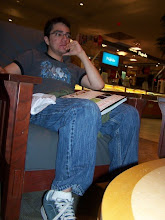 "You are the grim, goal-oriented ones who will not believe that the joy is in the journey rather than the destination no matter how many times it has been proven to you. You are the unfortunate ones who still get the lovemaking all confused with the paltry squirt that comes to end the lovemaking (the orgasm is, after all, God's way of telling us we've finished, at least for the time being, and should go to sleep)...You say you want to know how it all comes out...For an ending, you only have to turn to the last page and see what is there writ upon...And so, my dear Constant Reader, I tell you this: You can stop here...Endings are heartless.
"You are the grim, goal-oriented ones who will not believe that the joy is in the journey rather than the destination no matter how many times it has been proven to you. You are the unfortunate ones who still get the lovemaking all confused with the paltry squirt that comes to end the lovemaking (the orgasm is, after all, God's way of telling us we've finished, at least for the time being, and should go to sleep)...You say you want to know how it all comes out...For an ending, you only have to turn to the last page and see what is there writ upon...And so, my dear Constant Reader, I tell you this: You can stop here...Endings are heartless.Ending is just another word for goodbye."
When I started Stephen King's seventh and final book of the Dark Tower series, The Dark Tower, I knew that I had to take the book slow. I knew that I had to savor each paragraph, each sentence, and enjoy the experience. Because I knew that the ending could never and would never live up to what I wanted.
I won't bother you too much with what I wanted. Suffice it to say, it was along the lines of a philosophical and psychological battle at the top of the Dark Tower between Roland and Randall Flagg. I was hoping for something along the lines of the climax of Michael Crichton's Sphere. But it would be silly for me to expect an ending like that out of King. He has his own style and voice, and that is why I like him.
I've come to the realization that my favorite writers are sort of like friends. There are many things I love about them, and then there are the human imperfections that they have. There are little ways of writing the odd sentence or expressing a specific emotion in a scene that bother me about the writers I love. But like a friend who has a quirk that can be annoying, I'm starting to learn to accept these little idiosyncrasies because they are part of how that writer writes.
So, the ending of The Dark Tower is a very horror/B-movie/pulpy kind of ending, but what more can be expected out of Stephen King? I finished the Epilogue of the book late at night, and vowed not to read the rest (the Coda and the complete Robert Browning poem "Childe Roland to the Dark Tower Came") until the next day. However, my curiosity got the better of me. I read the Coda, which includes the quote I have up above. I wish I hadn't read it.
At all. I mean, I wish that the novel ended with the Epilogue. The Epilogue is perfect, it resolves the subplot of the piece. The chapter before that SPOILERS START has Roland walking up to the Tower SPOILERS END. I honestly feel the piece could have ended there, with the rest of the story a mystery. I am sure King would have gotten tons of angry letters and death threats that way, but it would have been a better ending. It calls back to the endings of The Waste Lands and Song of Susannah, with their dramatic climax that sort of has an "Until next time!" feel to it. I would rather not have known what happens in the Dark Tower than have read what King gives us. The Coda, as King warned it would in a very Lemony Snicket Unfortunate Events sort of way, hurts and fails to satisfy.
When the anime Neon Genesis Evangelion ended, fans were disappointed and complained so much that Hideaki Anno presented an alternate ending in the movies where pretty much everyone dies and Anno gives the finger to his fans. I loved the series ending.
I've spoken more on the ending than I would have liked. The point is, that despite my feelings towards the ending, it is a great book. I have my beefs with the introduction of new characters and the exits of older characters, but for the most part I really liked it. In fact, as an ending to the Dark Tower series and to a lot of other loose ends in King's writing, it fits perfectly. All except the actual ending. In a way, that is kind of amusing. Parts of the book got me teary eyed. Parts of the book made me grin. Despite my attempt to enjoy the book slowly, I devoured it. But I still savored it, trying not to be the glutton at a fine cooked meal who fails to stop and taste what he's eating because he's too busy shoving it down his throat. If you read this book, savor it as much as you can. Enjoy the ride as much as you can. The lovemaking is in the pages leading up to the ending, not in the paltry squirt that follows.






